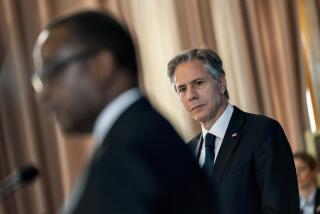CHANGE : East Africa Sets Stage for Political, Fiscal Revolution : Potential for progress is great in Kenya, Uganda and Tanzania, experts say.
- Share via
NAIROBI, Kenya — Seldom have Africans been asked, and asked themselves, to make so much progress so quickly.
Two revolutions, one political and one economic, are under way in East Africa--the result of external pressures from donor nations in the West and internal demands from young Africans for better lives than history has so far given them.
If it succeeds, this part of the continent could prove a whole school of African doomsayers wrong. But even so, there will not be many banner headlines about Kenya, Uganda and Tanzania until they become, like many Asian nations before them, emerging commercial markets and exciting mainstream tourism draws.
On this continent, experts say, only nations adjacent to South Africa hold greater potential for rapid progress.
Those who see Japan as a far-sighted nation that perceives opportunity might note this: In 1996, Japan is expected to overtake the United States as the No. 1 donor of development aid to Africa, the United Nations reports. And 30% of the Japan Overseas Cooperation Volunteers now come to Africa.
Kenya, Uganda and Tanzania are moving, albeit fitfully, toward the elusive goals of representative, accountable government and economic development.
The signs are apparent, the energy palpable. Education is on the rise and with it ambition. Women are asserting themselves with demands for prosperity and fairness. Each country has produced a small entrepreneurial class, along with the beginnings of a middle class and enough young leaders to challenge every awful stereotype about post-colonial African politicians.
The most hopeful sign of all may be that when East Africans speak of generational change, they now expect a change for the better.
So why are analysts still so jittery about East Africa? African revolutions have a nasty habit of veering into the thorn bush of disappointment. And both democracy and free-market economics are based on open competition--requiring lethargic Establishment elites here to risk more than they might normally dare.
Meantime, population growth still threatens to overrun economic progress in the region. Domestic corruption and instability, along with international paternalism and outright racism, still stigmatize Africa for investors and visitors.
Diplomats, business people and analysts say these are the important forces at work:
DOMESTIC
At the end of this month, Tanzania holds national elections, its first multi-party vote since independence. Residents of the island of Zanzibar are agitating for autonomy. And Tanzanians are desperate to escape the poverty that makes the nation one of the poorest in the world.
A onetime socialist stronghold, Tanzania has recently begun to draw a few high-risk investors who believe that it will emerge strengthened by its vote. Zanzibar, by expanding its free port, dreams of again becoming the trade center of East Africa.
But if the Tanzanian elections are destabilizing or rigged, Western donors say they will turn their backs on the country.
Uganda, the reigning darling of the region, at least in the eyes of Western diplomats, adopted a new constitution this month calling for presidential elections next year but outlawing political parties until the year 2000. Western support remains solid, but American and other backers worry about any government that falls short of full democracy.
Emerging from years of war and turmoil, Uganda is now the fastest-growing economy in the region. But it also is landlocked and highly dependent on its neighbors Kenya and Tanzania. Uganda also faces a stubborn guerrilla insurgency in the north.
Kenya is the strongest and historically most stable of the three nations. But political and ethnic divisions have been boiling there for years, and its entrenched rulers face democratic elections scheduled for 1997.
Just this week, Kenyans got a taste of the bloody possibilities when a Nairobi slum erupted in days of riots. At least four were killed and thousands displaced when one ethnic group loyal to the government clashed repeatedly with another aligned with the political opposition.
Using aid as carrot and stick, Western countries have been coaxing and bullying Kenya for years to allow greater political and economic competition. Business executives and younger politicians have enthusiastically pushed ahead, but the Old Guard leaders remain steadfast in the belief that nothing is as important to Kenya’s future as their control over it.
REGIONAL
The three nations, former territories of British colonialism, have long recognized that they would be stronger and more prosperous by cooperating as a bloc. But for just as long, political self-interest has held them back. One effort at regional economic integration flopped in 1977.
Last year, the presidents of the three countries pledged to try again, raising hopes and anxiety. The first small step for these longtime trading partners was to make their currencies convertible--a process that will be complete in December.
Since last year’s agreement, Tanzania and Uganda, along with the business class in Kenya, have proceeded with other plans for economic integration. But, again, Kenya’s political leaders are dragging their feet, no doubt content with their traditional dominance over East African trade.
Worse, Presidents Daniel Arap Moi of Kenya and Yoweri Museveni of Uganda, never friendly, seem eager to heighten their political differences rather than emphasize their economic interdependence. They have accused each other of harboring rebels and stirring border unrest.
And they find themselves at opposite sides of the Rwandan powder keg: With millions of Rwandans still bitterly resolved to settle old scores in the region by force, Museveni is positioned as mentor to the present Rwandan government; Moi is a patron of the ousted regime.
Meanwhile, Uganda and Tanzania announced this month that they will proceed toward regional ties, with or without Kenya. One idea being discussed is building inland trade roads and pipelines that would circumvent Kenya. So far, Kenya has responded competitively, announcing it will establish its own free port to counter Zanzibar’s.
More to Read
Sign up for Essential California
The most important California stories and recommendations in your inbox every morning.
You may occasionally receive promotional content from the Los Angeles Times.













